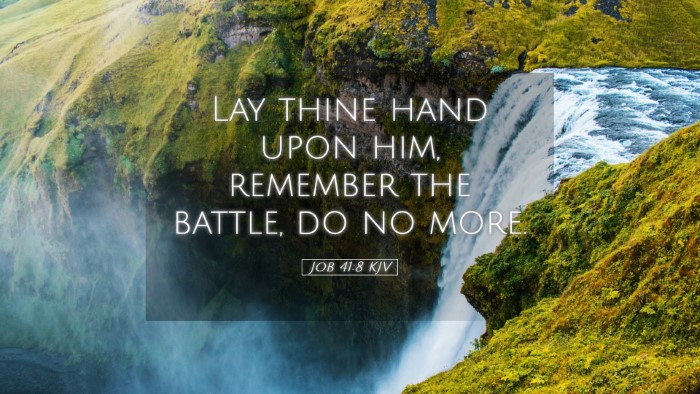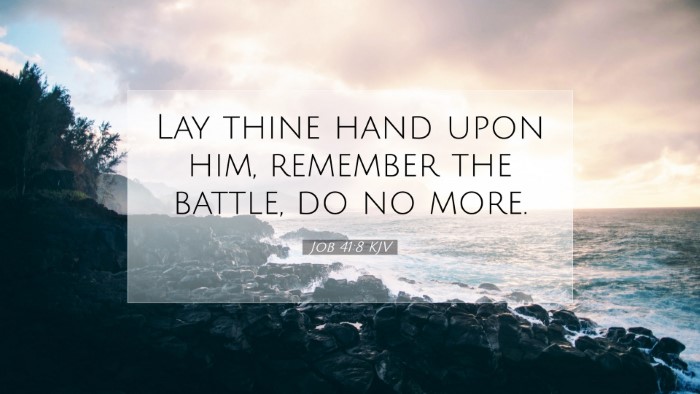Commentary on Job 41:8
Job 41:8 states, "Lay thine hand upon him, remember the battle, do no more." This verse occurs within the context of God's dialogue with Job, where He describes the might of the creature known as Behemoth or Leviathan. The mention of this fearsome creature serves as a reminder of God's sovereign power over creation.
Understanding the Context
The book of Job addresses profound themes of suffering, divine sovereignty, and human understanding. Job, a man of great faith, is tested through extreme suffering. As God speaks to Job, He emphasizes His omnipotence manifested in the creation of formidable beings.
Exegesis of Job 41:8
- Lay thine hand upon him: This phrase suggests an invitation to confront the beast. However, it also implies the futility of such an action against a creature of such immense strength.
- Remember the battle: This serves as a reminder of the inherent danger in attempting to engage with the Leviathan. It implies that past confrontations with formidable challenges are fraught with peril.
- Do no more: This can be interpreted as a warning. It encourages restraint and acknowledgment of one's limitations in the face of overwhelming challenges.
Theological Insights
Job 41:8 highlights significant theological themes:
- The Sovereignty of God: God’s challenge to Job emphasizes that His ways and creations surpass human understanding. This encourages believers to recognize their place within God's order.
- The Nature of Creation: The verses describe the might of creatures designed by God, illustrating the respect and reverence due to the Creator.
- Human Limitations: This verse serves as a reminder of human vulnerability, encouraging reliance on God rather than self-sufficiency.
Insights from Matthew Henry
Matthew Henry, in his commentary, focuses on the might of Leviathan as an emblem of chaos and disorder. He notes that the phrase “lay thine hand upon him” challenges human arrogance. Henry emphasizes that humanity should not attempt to confront such powers without recognizing their limitations.
Henry also stresses that this creature symbolizes the trials and tribulations that may confront us, urging believers to seek God’s help rather than confronting these challenges alone.
Insights from Albert Barnes
Albert Barnes provides a detailed description of Leviathan, examining its implications in Job 41:8. He argues that the reference to laying a hand on Leviathan serves to highlight human impotence against such mighty beings. Barnes reminds readers that engaging with such a formidable entity may lead to destruction rather than victory.
Furthermore, Barnes interprets the call to “remember the battle” as a reflection on the reality of spiritual warfare, encouraging believers to understand the nature of their adversaries and the importance of divine support.
Insights from Adam Clarke
Adam Clarke’s commentary dives into the metaphorical aspects of Leviathan. He notes that Leviathan represents not only a physical threat but also the psychological battles one grapples with. Clarke suggests that the phrase “do no more” encapsulates a profound reality—that once one has pursued a conflict with spiritual or existential challenges, it is time to cease striving in one’s strength alone and seek God’s intervention.
Clarke underscores the need for humility in facing life’s struggles, emphasizing reliance on God’s wisdom and power rather than human effort.
Application for Pastors and Theologians
This verse serves as a powerful reminder for pastors and theologians regarding the theme of human limitations and the majesty of God:
- Preaching God’s Sovereignty: Pastors can use this verse to illuminate the theme of divine sovereignty, encouraging congregations to trust in God's power amidst trials.
- Understanding Human Helplessness: The verse can form the basis for discussions about human frailty and the importance of submission to God’s authority.
- Encouraging Spiritual Warfare Awareness: The insights from Barnes can guide discussions on the nature of spiritual battles and the necessity of divine aid.
Conclusion
Job 41:8 serves as a poignant reminder of the power and majesty of God in contrast to human weakness. Through the insights from respected commentaries, one can appreciate the rich tapestry of meaning encapsulated in this verse. It challenges believers to reflect on their struggles, recognize their limitations, and ultimately turn towards the sovereign God who created all things.


